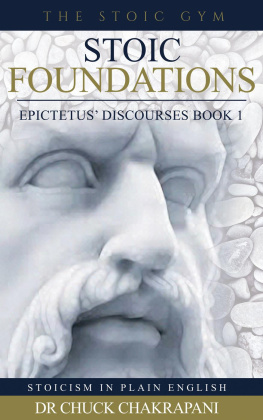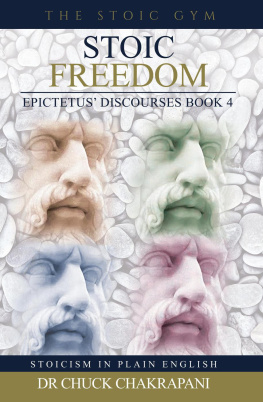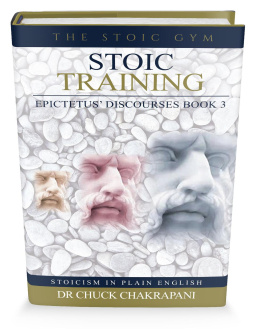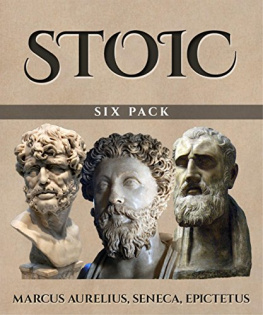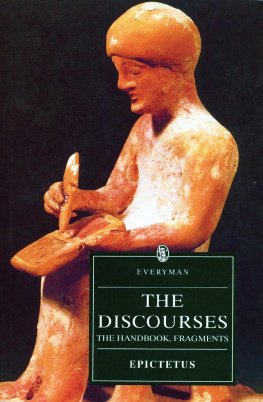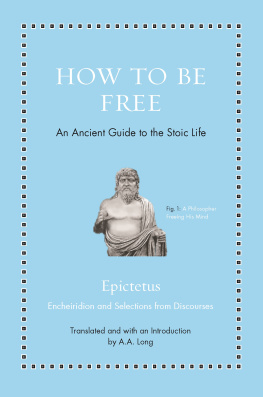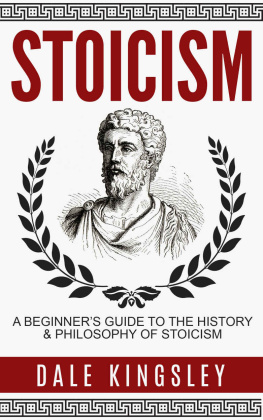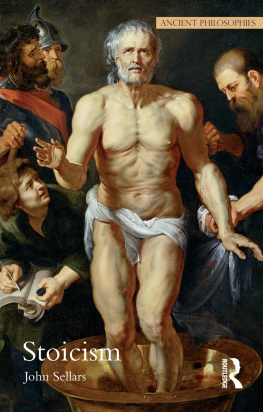Stoic Foundations
Epictetus Discoures Book 1
Stoicism in Plain English
Dr Chuck Chakrapani
The Stoic Gym Publications
Copyright 2017 by Chuck Chakrapani
All rights reserved. No part of this publication may be reproduced, distributed or transmitted in any form or by any means, including photocopying, recording, or other electronic or mechanical methods, without the prior written permission of the publisher, except in the case of brief quotations embodied in critical reviews and certain other non-commercial uses permitted by copyright law. For permission requests, write to the publisher, addressed Attention: Permissions Coordinator, at the address below.
Stoic Gym Publications
www.thestoicgym.com
Book Layout 2017 BookDesignTemplates.com
Ordering Information:
Quantity sales. Special discounts are available on quantity purchases by corporations, associations, and others. For details, contact the Special Sales Department at the address above.
Stoic Foundations/Chuck Chakrapani. 1st ed.
ISBNs:
Print: 978-0-920219-24-9
ePub: 978-0-920219-25-6
Mobi: 978-0-920219-26-3
PDF: 978-0-920219-27-0
17 18 19 20 21 22 23 24 25 261 2 3 4 5 6 7 8 9 0
Contents
Introduction
The Reason Why
T here are many excellent translations of Epictetus Discourses in English. Even the nearly century-old translation by William A. Oldfather is very readable. So why a plain English version?
The most important reason for a plain English version is that the standard translations have an implicit obligation to follow the original text closely. Unfortunately the original text was written about two thousand years ago in Koine Greek and Discourses was never edited for publication. In the intervening time, the meanings of words have changed. All this creates problems for the modern reader. Mostly, the standard translations look daunting. It took me about ten years from the time I bought a copy of Discourses to the time I actually ventured to read it from cover to cover. I found that the translations, as excellent as they might be, were not easy to read for several reasons such as:
- Dense layouts;
- Archaic and intrusive numbering system;
- Obscure references;
- Convoluted sentences.
- Non-descriptive chapter headings.
These may not deter scholars and academics, but common readers may not be so motivated. It is not the fault of the translators either. After all, translators are bound by the structure of the original text written about two thousand years ago. In general they cannot deviate from it, even if the translation gets obscure in places. They can add footnotes and add explanations, but that calls for additional effort to understand.
So a reader, who is not reading Discourses for scholarly purposes, can benefit immensely from a rendition that is true to the original text, but uses contemporary English. This is what this edition of Discourses does. More specifically this edition
- Uses modern English, simple words and shorter sentences
- Rearranges a few sentences so they flow well
- Deletes obscure references when not necessary
- Attempts to use gender-neutral language from time to time to remind the readers that the principles are applicable to both men and women
- Adds clarifications in the text rather than in End Notes
- Occasionally tones down excessive references to God, gods, Zeus and the like
I have also introduced some enhancements to the original:
- Descriptive discourse titles and subheadings within discourses.
- A summary of key ideas of each discourse at the beginning of the discourse.
- Clarification and occasional commentary in parentheses.
Through all these changes, I have tried to remain true to the spirit of what Epictetus was trying to say. To this end, I consulted several translations by eminent scholars while putting this edition together.
Is there a cost to all these changes? Probably. There might be some occasional loss in accuracy, especially when used for scholarly purposes just as happens when a legal document is written in plain English. But, I believe the benefits of readability far outweigh the disadvantages of minor inaccuracies in places. As Saki put it so well A little inaccuracy sometimes saves tons of explanation.
I would like to think that I have achieved my objectives but is for the reader to judge how well I succeeded in doing so.
A note on the titles in this series
The history of Discourses is well-known. Flavius Arrian, a student of Epictetus, transcribed the discussions Epictetus had with his students and visitors. He collected them in several Books (generally assumed to be eight, although only four survive). The books do not have specific themes and generally referred to Book I, II, III and IV. A.A. Long, however, believes that the first two books deal primarily with theoretical and methodological issues while the third and the fourth book deal with social and vocational issues.
I wanted to call each book by a name, rather than simply Book I, Book II etc. As there is considerable overlap of themes and topics among the four books, I looked for the dominant theme in each book and I believe I found it. Because similar themes recur in all four books, my judgement and choice of titles are inevitably arbitrary, but probably not too irrational.
How the books got their title
The first book of Discourses clearly lays out the foundations of Stoic philosophy of Epictetus. The first discourse is at the core of Stoic teachings. The book deals with the promise of philosophy, the importance of logic and reason, the law of life and how to live in this world. This book is titled Foundations.
The second book of Discourses deals with choices: caution vs. confidence, greatness vs. carefulness, good vs. evil, knowing vs. acting on our preconceptions, talking vs. practicing and several such choices. This book i s titled Choices .
The third book deals with how to progress with our learning. How to train ourselves, what should be its main purpose, how to cope with impressions, how to bear illnesses, how we should not allow ourselves to be disturbed by news, and how to cope with failure and want. This book i s titled Practices .
The fourth book has a lot to say about personal freedom. It starts with one of the longest discourses and it is on freedom. Freedom is one of Epictetus basic themes and it recurs in many places in all four books. But freedom is expounded most prominently in the fourth book. This book i s titled Freedom .
In addition, there is a summary of Epictetus teachings Enchiridion . There are scattered quotes called Fragments not found in Discourses which appear in books by other authors. Then there is the biography of Epictetus himself. To make this series complete in terms of Epictetus, I have included these materials in a fifth book. I call this book Inspiration .
Taken together, these five books make up the complete (available) works of Epictetus as well his biography.
Is this book for you?
If your aim is to understand Discourses without spending too much time and effort, you have come to the right place. If you are looking for a scholarly translation of Discourses , perhaps you should look elsewhere.
Basic Principles
Stoic Foundations
E pictetus makes this bold claim If you want, you are free. If you want, you will blame no one, you will accuse no one if you want, everything will happen according to your plan. (Discourses 1.17.28). His teachings explore how we may achieve this unconditional freedom.
Stoicism, especially as expounded by Epictetus, consists of a few major themes that are repeated over and over again - sometimes in exactly the same way, sometimes in a different way. The first book seems to be a particularly good summary of Stoic principles as taught by Epictetus.
Next page
